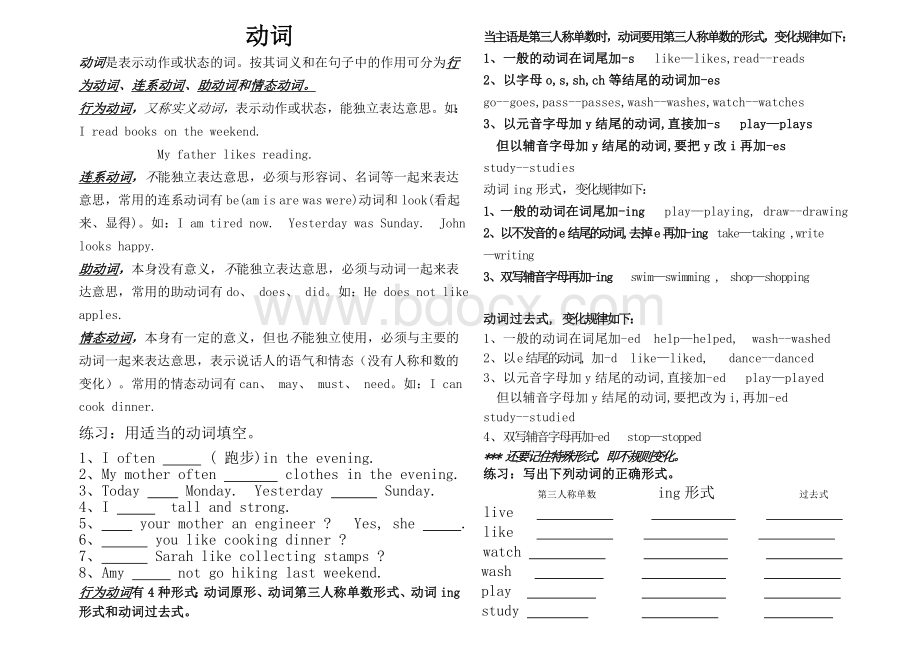六年级英语动词Word格式.doc
《六年级英语动词Word格式.doc》由会员分享,可在线阅读,更多相关《六年级英语动词Word格式.doc(3页珍藏版)》请在冰豆网上搜索。

练习:
用适当的动词填空。
1、Ioften(跑步)intheevening.
2、Mymotheroftenclothesintheevening.
3、TodayMonday.YesterdaySunday.
4、Itallandstrong.
5、yourmotheranengineer?
Yes,she.
6、youlikecookingdinner?
7、Sarahlikecollectingstamps?
8、Amynotgohikinglastweekend.
行为动词有4种形式:
动词原形、动词第三人称单数形式、动词ing形式和动词过去式。
当主语是第三人称单数时,动词要用第三人称单数的形式,变化规律如下:
1、一般的动词在词尾加-slike—likes,read--reads
2、以字母o,s,sh,ch等结尾的动词加-es
go--goes,pass--passes,wash--washes,watch--watches
3、以元音字母加y结尾的动词,直接加-splay—plays
但以辅音字母加y结尾的动词,要把y改i再加-esstudy--studies
动词ing形式,变化规律如下:
1、一般的动词在词尾加-ingplay—playing,draw--drawing
2、以不发音的e结尾的动词,去掉e再加-ingtake—taking,write--writing
3、双写辅音字母再加-ingswim—swimming,shop—shopping
动词过去式,变化规律如下:
1、一般的动词在词尾加-edhelp—helped,wash--washed
2、以e结尾的动词,加-dlike—liked,dance--danced
3、以元音字母加y结尾的动词,直接加-edplay—played
但以辅音字母加y结尾的动词,要把改为i,再加-edstudy--studied
4、双写辅音字母再加-edstop—stopped
***还要记住特殊形式,即不规则变化。
写出下列动词的正确形式。
第三人称单数ing形式过去式
live
like
watch
wash
play
study
stop
pass
swim
buy
take
☆时态☆
小学阶段学的四种时态:
一般现在时,现在进行时,一般过去时,一般将来时。
1、一般现在时表示经常的或习惯性的动作或状态。
构成:
主语+动词的适当形式。
A、表示不受时限的客观存在
Sheisastudent.Thisisadog.Ihaveastory-book.
B、表示现在的习惯动作,即指现在经常发生的动作。
常与often,usually,sometimes,always,everyday,everymorning等表示程度或频度的词连用。
Ioftengotoschoolonfoot.MikewatchesTVeveryday.
☆练习:
根据中文意思把句子补充完整。
(1)、我的父亲是个医生。
Myfather.
(2).我的父亲下午经常打篮球。
Myfather.
(3)、我的父亲喜欢运动。
2、
现在进行时表示正在进行或发生的动作。
构成:
主语+be+动词的ing
Iamwritingaletter.Amyisswimming.Theyarereadingbooks.
(1)、我正在做作业。
I.
(2)、John正在看电视。
John.
(3)、Amy和Sarah正在下棋。
AmyandSarah.
3、一般过去时表示在过去某个时间发生的动作或存在的状态,也可表示过去经常或反复发生的动作。
常与yesterday,yesterdayafternoon,lastyear…等表示过去的时间连用。
主语+动词的过去式
Iwenttoaparkyesterday.
1、我昨天很累。
I.
2、我昨天踢足球了。
3、他昨天晚上洗了他的衣服。
He.
4、Amy上个周末看望她的语文老师。
Amy.
4、一般将来时表示在将来某个时间要发生的动作或存在的状态,常与tomorrow,tomorrowafternoon,nextweek…等表示将来的时间连用。
主语+begoingto+动词的原形或主语+will+动词的原形
1、我打算明天放风筝。
I.
2、John打算今晚看电视。
John.
3、Sarah打算下个星期跟她妈妈去旅行。
Sarahwithhermother.
4、ZhangPeng和John打算周末踢足球。
ZhangPengandJohn
☆时态☆练习二
一、用所给动词的适当形式填空。
1、play
(1)Iusuallyfootballontheweekend.
(2)Ifootballnow.
(3)Ifootballwithmyfriendsyesterday.
(4)Ifootballtomorrow.
(5)Ifootballtomorrow.
2、clean
(1)SarahusuallyherroomonSaturdays.
(2)Sarahherroomnow.
(3)Sarahherroomlastweekend.
(4)Sarahherroomnextweekend.
(5)Sarahherroomnextweekend.
3、eat
(1)Theyusuallydinnerat7:
00p.m.
(2)Theydinnernow.
(3)Theydinnerat6:
30p.m.yesterday.
(4)Theydinnerat8:
00p.m.tonight.
(5)Theydinnerat8:
4、walk
(1)Amyusuallytoschool.
(2)JohnandIusuallytoschool.
(3)JohnandItoschoollastMonday.
(4)JohnandItoschoolnow.
(5)JohnandItoschooltomorrow.
(6)JohnandItoschooltomorrow.
5、read
(1)Iusuallybooksontheweekend.
(2)ZhangPengusuallybooksontheweekend.
(3)Amyandherbrotherusuallybooksontheweekend.
(4)Ibooksnow.
(5)Myfatheranewspapernow.
(6)Ilikebooks.
(7)ImanyEnglishwordslastnight.
(8)Mysisterastorybookyesterday.
(9)Iastor